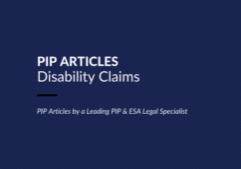No Need To Score Points To Be Successful
Zero points in the ESA test was the right score for Mr Jones, but he should not have been found fit for work. He initially went to Citizens Advice for help with its ESA appeal and the letter sent to him after their first meeting was passed to us. They confirmed that they would not be able to attend an appeal hearing with him, but would help him to prepare his case and would present it in writing. No surprise there but what did surprise us was that at nowhere in that three page letter is there any indication as to the merit of his appeal, his prospects of success or why he should not have been found fit for work. Bizarre.
We took instructions in March 2019 and went through the ESA test with him, agreeing with the Department agreeing with them that he should not have scored any points. We explained to him that the exceptional circumstances provisions in regulations 29 and 35 should have applied and our advice was that he should have qualified for ESA and more than that, he should have been placed in the support group. We told them that we expected to succeed and discussed sources of evidence to support that view. Regulation 29(2) allows a claimant to be treated as satisfying the point-scoring test and so qualify for the benefit, on the basis that there would be a substantial risk to his (or someone else’s) physical or mental health if he was found fit for work and had to be a work-seeker. It looks at what would be involved at a suitable place of work, or on the journey to that place. Regulation 35(2) allows someone to qualify for the support component if there would be a substantial risk to someone’s physical or mental health if they had to meet the requirements of the work-related activity group. This work-related activity had to be set out by the Department in the appeal papers. We said that some of it could be done, but that many elements would have affected his mental health. His appeal was lodged online and once we had the appeal reference, the tribunal office estimated that his appeal would not come up for a hearing before July 2020, a very long time, and we were somewhat taken aback to receive notice of a hearing in July 2019.
Mr Jones is badly affected by eczema that is poorly controlled so that he regularly has to apply topical steroids, emollients and Viscopaste bandages. His limbs, abdomen and lower back and face are all badly affected. He claimed ESA after his employer terminated his employment in a food factory after six years. He was doing well and was on his way to becoming a supervisor. Occupational Health set out what support he needed, but it was not what his employer wanted to hear.
Once we had appeal papers, we were able to go through the assessment report with Mr Jones and found many examples of where the assessor had misunderstood, made mistakes or left out important information that was given to them. We were then able to put together a submission for the tribunal, explaining what was wrong with the assessment report, explaining why he should have been found unfit for work and why the exceptional circumstances provisions should have applied, making reference to an Upper Tribunal decision and one made by the Court of Appeal. We took a witness statement from Mr Jones’ dad and two more from friends and all of the evidence was submitted to the tribunal well ahead of the hearing.
The appeal was heard at the Llandrindod Wells Justice Centre and Mr Jones’ dad was there to support his witness statement. A Presenting Officer was there to represent the Secretary of State. After the judge had done the introductions, he explains the tribunal's view that Mr Jones was put at substantial risk because of the infections affecting his eczema, at which point I felt able to relax. The Presenting Officer was asked for his view and he conceded that Mr Jones should have been placed in the support group. You never know how a hearing is going to go and we have to be ready to put questions to our witnesses and argue every legal point included in the submission. Happily, none of this proved to be necessary and Mr Jones succeeded without having to answer a single question. The judge explained the tribunal's view that no reassessment should take place within 18 months of the hearing date and the tribunal made that recommendation, which is not binding upon the Department, but which we have never seen ignored.
Mr Jones has been missing out on the support component of ESA, currently £38.55 a week but at least he will receive this in one lump sum as his arrears should amount to £1200. We do not yet know whether Mr Jones would have a claim to personal independence payment (PIP) but we will go through the test with him in the coming days and help him with the claim, if appropriate. In the meantime, he can focus on his health and worry a little less on his finances.


 Personal Independence Payments (PIP) for over 65
Personal Independence Payments (PIP) for over 65